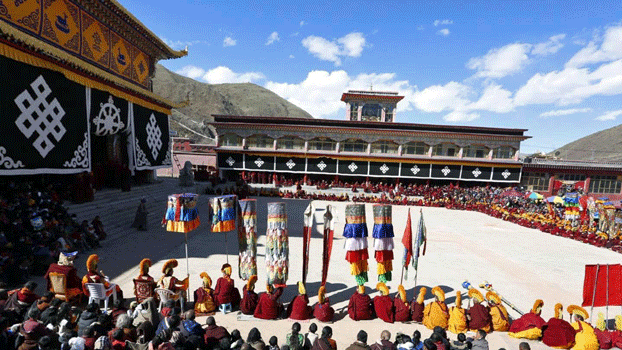A Chinese police surveillance unit is operating, apparently for the first time, inside a Buddhist monastery as part of a renewed crackdown on Tibetan Buddhist religious institutions, a Tibetan with knowledge of the situation said.
Officers were installed this year at the Palyul Thartang Gonchen Monastery in Qinghai province’s Golog (in Chinese, Guoluo) Tibetan Autonomous Prefecture, said the source, who lives in exile but knows what is happening there.
“A surveillance team member has also been posted by the Chinese government in this unit to scrutinize monks and their daily activities,” he said.
Police installed surveillance cameras around the monastery, and officers inside monitor the monks around-the-clock, the source said. Some pressure young monks to attend schools run by the Chinese government, the Tibetan in exile said.
“Chinese authorities have also installed a specific app on their mobile phones to identify and track their conversations, so it’s not safe for the monks to communicate with Tibetans in exile,” he said.
After the deadly 2008 uprising in Tibet, Chinese authorities began setting up police stations and military barracks outside the Gaden, Drepung and Sera monasteries — highly regarded centers for learning and practicing Tibetan Buddhism — near Tibet’s capital Lhasa.
The deadly protests over the Chinese government’s persecution of Tibetans in mid-March 2008 started in Lhasa before spreading to other areas of the Tibet Autonomous Region (TAR). Tibetan protesters clashed with members of China’s Han ethnic majority and the Hui ethnic minority, leading to a brutal Chinese crackdown.
Afterwards, Zhang Qingli, the TAR’s former Communist Party chief, began setting up mobile police units across the region, which are still operating today, monitoring the activities of the monks in the monasteries. But the case in Golog is apparently the first time police officers have been stationed inside the monastery itself.
Golok Jigme, a Tibetan and former political prisoner who now lives in Switzerland, said authorities now require Tibetans to install tracking app on their phones.
The app allows authorities “unprecedented access” to Tibetans’ phone data and conversations, he said.
“Many Tibetans are interrogated, threatened, imprisoned, punished and their cell phones are confiscated at times,” he said.

